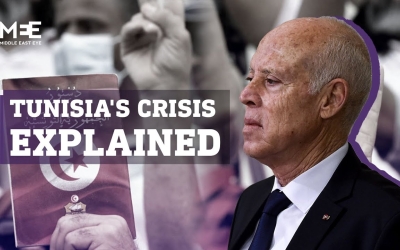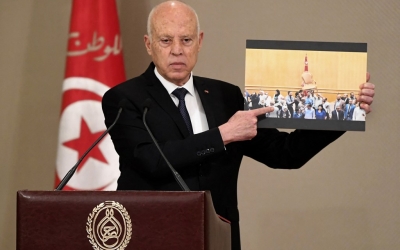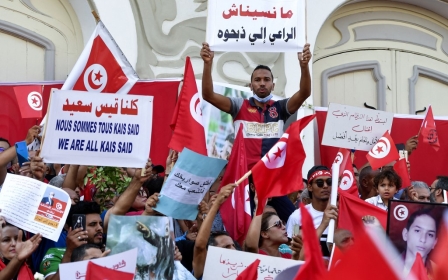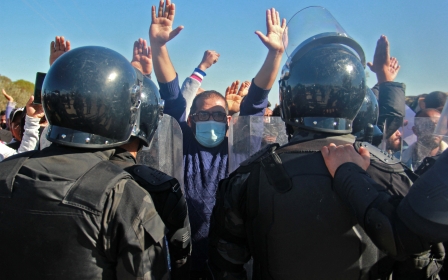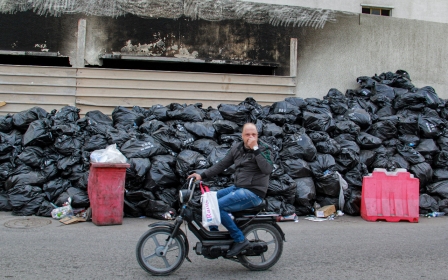Tunisia: Protesters clash with police as thousands rally against Saied's coup
Thousands of Tunisians protesting against President Kais Saied's power grab tried to march on the suspended parliament on Sunday, as hundreds of police blocked off the area.
Protesters briefly clashed with police as they tried to remove barriers near the chamber and demanded that Saied restore parliament and normal democratic rule, Reuters reported.
Protesters chanted "Shut down Kais Saied" and "Freedom! Freedom! End the police state!" as they pulled down barriers obstructing the roads leading to the parliament building at the capital's Bardo palace.
The demonstrators "shut down all the streets, the avenues, the motorways", Jawhar Ben Mbarek, a figure of the Tunisian left, told AFP.
"After shutting down the state, Saied has shut down the institutions, the constitution. He has shut down the country," he said.
Social media users shared images of police using cars and mini-vans to block protesters from reaching the suburb of Bardo, where the parliament building is located.
Several members of the Islamist Ennahdha party, a key force in the dissolved parliament, were at the forefront of the procession alongside left-wing representatives, holding signs reading: "MPs against the coup."
Other protesters gathered near parliament, Tunisian flags in hand, and shouted their opposition to military trials for civilians.
Sunday’s protest was the latest rally opposing Saied's 25 July decision to sack the government, suspend parliament and seize an array of powers, citing an "imminent threat" to the country - birthplace of the Arab Spring uprisings against autocracy.
The latest violence followed clashes last week between police and protesters in the southern town of Agareb, in which one person was killed.
A divided nation
Saied, who was elected in late 2019, made his shock move in July amid a socio-economic crisis aggravated by the Covid-19 pandemic.
Then, on 22 September, Saied suspended parts of the constitution and installed rule by decree, maintaining full control of the judiciary as well as powers to sack ministers and issue laws.
He appointed a new government in October, with Najla Bouden as the North African country's first female prime minister.
But he has significantly pared back the powers of her office and will technically head the administration himself.
While his actions appeared to have some popularity among Tunisians, increasingly vocal opposition, along with a looming crisis in public finances, may pose a new test of how Saied and the new government he has appointed will tackle threats to their authority.
Some of Saied’s opponents have accused him of seeking a new dictatorship, a decade after Tunisia’s 2011 revolt that overthrew dictator Zine El Abidine Ben Ali.
But the president's supporters say his moves were needed after years of deadlock among political parties seen as corrupt and self-serving.
Unpopular economic reforms
As Tunisia struggles to get out of a deep financial crisis, its economy and planning minister said on Sunday that Tunisia would soon announce an economic recovery plan for 2023-25, Reuters reported.
"Reviewing subsidies, reforms of state firms and fiscal policies are reforms that would restore the state's financial balance," Samir Said said.
Tunisia recently resumed talks with the International Monetary Fund (IMF) on a loan package predicated on Tunis imposing painful and unpopular steps aimed at liberalising the economy.
Negotiations with the IMF for a package were halted on 25 July when Saied dismissed the government, suspended parliament and assumed executive authority.
Last week, the powerful UGTT union rejected any plans that would include cutting subsidies, blocking reforms and complicating government efforts to reach a deal with IMF on a rescue package.
International donors have highlighted the need for broad popular support in Tunisia for reforms to help tackle corruption and waste, meaning Saied would likely need the backing of the UGTT, which represents one million workers in the country of 12 million people and wields huge political clout.
The IMF has urged Tunisia to slash subsidies and its bloated public sector wage bill as well as privatise loss-making state-owned enterprises - all steps that remain very unpopular with the public.
Middle East Eye delivers independent and unrivalled coverage and analysis of the Middle East, North Africa and beyond. To learn more about republishing this content and the associated fees, please fill out this form. More about MEE can be found here.


